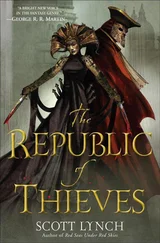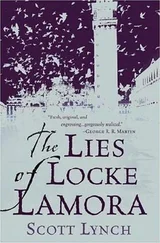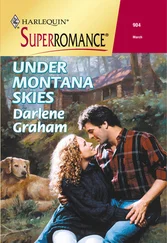"And what if we chance across one of those patches of… damn, Jean, what are they called? No wind whatsoever?" "Doldrums," said Jean.
"Exactly," said Locke. "Even we know that you can't presume a constant speed with wind and sails; you get what the gods send you. We could be stuck on a flat ocean fifty miles from Tal Verrar, on day sixty-three, dying for no reason at all."
"Remotely possible, but unlikely. I'm well aware that there's a great element of risk in the task I'm handing you; the possibility of a vast return compels me to play the odds. Now… speak no more of this for the time being. Here's what I" ve brought you out to see."
There was a golden ripple on the black water ahead, and faint golden lines that seemed to sway in the air above it. As they drew closer, Locke saw that a wide, dark shape covered the artificial river completely, from one bank to the other — a building of some sort… and the golden lines appeared to be cracks in curtains that hung down to the water. The boat reached this barrier and pushed through with little trouble; Locke shoved heavy, damp canvas away from his face, and as it fell aside the boat burst into broad daylight.
They were inside a walled and roofed garden, at least forty feet high, filled with willow, witchwood, olive, citrus and amberthorn trees. Black, brown and grey trunks stood in close-packed ranks, their vine-tangled branches reaching up in vast constellations of bright leaves that entwined above the river like a second roof.
As for the actual roof, it was scintillant, sky-blue and bright as noon, with wisps of white clouds drifting past half-visible between the branches. The sun burned painfully bright on Locke's right as he turned around to stare straight ahead, and it sent rays of golden light down through the silhouetted leaves… though surely it was still the middle of the night outside. "This is alchemy, or sorcery, or both," said Jean.
"Some alchemy," said Stragos in a soft, enthusiastic voice. "The ceiling is glass, the clouds are smoke, the sun is a burning vessel of alchemical oils and mirrors."
"Bright enough to keep this forest alive under a roof? Damn," said Locke.
"It may indeed be bright enough, Lamora," said the Archon, "but if you'll look closely, you'll see that nothing under this roof besides ourselves is alive?
As Locke and Jean glanced around in disbelief, Stragos steered the boat up against one of the garden's riverbanks. The waterway narrowed there to a mere ten feet, to allow room for the trees and vines and bushes on either side. Stragos reached out to grasp a trunk and halt the boat, and he pointed into the air as he spoke.
"A clockwork garden for my clockwork river. There's not a real plant in here. It's wood and clay and wire and silk; paint and dye and alchemy. All of it engineered to my design; it took the artificers and their assistants six years to construct it all. My little glen of mechanisms."
Incredulously, Locke realized that the Archon was telling the truth. Other than the movement of white smoke clouds far overhead, the place was unnaturally still, almost eerie. And the air in the enclosed garden was inert, smelling of stale water and canvas. It should have been bursting with forest scents, with the rich odours of dirt and flowering and decay.
"Do I still strike you as a man farting in an enclosed room, Lamora? In here, I do command the wind…"
Stragos raised his right arm high above his head and a rustling noise filled the artificial garden. A current of air plucked at Locke's scalp, and steadily rose until there was a firm breeze against his face. The leaves and branches around them swayed gently.
"And the rain," cried Stragos. His voice echoed off the water and was lost in the depths of the suddenly Uvely forest. A moment later a faint, warm mist began to descend, a ticklish haze of water that swirled in ghostly curves throughout the imaginary greenery and enveloped their boat. Then drops began to fall with a soft pitter-patter, rippling the surface of the clockwork river. Locke and Jean huddled beneath their coats as Stragos laughed.
"I can do more," said Stragos. "Perhaps I can even call up a storm!" A stronger breath of air began to beat the rain and mist against them; the little river churned as a counter-current surged from somewhere ahead of them. Little whitecaps burst beneath the boat as though the water was boiling; Stragos clung to his chosen tree-trunk with both hands as the boat rocked nauseatingly. The raindrops grew heavier and harder; Locke had to shield his eyes to see. Clouds of thick, dark mist boiled overhead, dimming the artificial sun. The forest had come to life, flailing at the misty air with branches and leaves as though the faux greenery was at war with unseen ghosts.
"But only after a fashion," said Stragos, and without any apparent further signals from him the rain faded away. Gradually, the flailing of the forest died down to a soft rustling, and then to stillness; the surging currents of the river beneath them subsided, and in minutes the mechanical garden was restored to relative peace. Fingers of fading mist swirled around the trees, the sun peeked out from behind the thinning "clouds" and the enclosure echoed with the not-unpleasant sound of water dripping from a thousand branches and fronds and trunks.
Locke shook himself and pushed his wet hair back out of his eyes. "It's… it's gods-damned singular, Archon. I'll give it that. I" ve never even imagined anything like this." "A bottled garden with bottled weather," mused Jean. "Why?" Locke asked the question for both of them.
"As a reminder." Stragos released his hold on the tree-trunk and let the boat drift gently into the middle of the stream once again. "Of what the hands and minds of human beings can achieve. Of what this city, alone in all the world, is capable of producing. I told you my Mon Magisteria is a repository of artificial things. Think of them as the fruits of order… order I must secure and safeguard."
"How the hell does interfering with Tal Verrar's ocean commerce secure and safeguard order?"
"Short-term sacrifice for long-term gain. There is something latent in this city that will flower, Lamora. Something that will bloom. Can you imagine the wonders the Therin Throne might have produced given centuries of peace, had it not been shattered into all our warring, scrabbling city-states? Something is preparing to emerge out of all our misfortune at last, and it will be here. The alchemists and artificers of Tal Verrar are peerless, and the scholars of the Therin Collegium are just a few days away … it must be here!"
"Maxilan, darling." Locke raised one eyebrow and smiled. "I knew you were driven, but I had no idea you could smoulder. Come, take me now! Jean won't mind; he'll avert his eyes like a gentleman."
"Mock me as you will, Lamora, but hear the words I speak. Hear and comprehend, damn you. What you just witnessed," said Stragos, "required sixty men and women to achieve. Spotters watching for my signals. Alchemists to tend the smoke-pots and hidden crews to work the bellows and fans that produce the wind. There were several dozen merely pulling strings, as it were — the branches of my artificial trees are threaded with metal wire, like puppets, so that they may be shaken more convincingly. A small army of trained workers, straining to produce a five-minute spectacle for three men in a boat. And even that was not possible with the art and artifice of previous centuries.
"What more might we achieve, given time? What if thirty people could produce the same result? Or ten? Or one? What if better devices could give stronger winds, more driving rain, a harder current? What if our mechanisms of control grew so subtle and so powerful that they ceased to be a spectacle at all? What if we could harness them to change anything, control anything, even ourselves? Our bodies? Our souls} We cower in the ruins of the Eldren world, and in the shadow of the Magi of Karthain. But common men and women could equal their power. Given centuries, given the good grace of the gods, common men and women could eclipse their power."
Читать дальше












